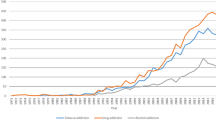Abstract
The field of psychedelics is in an important era, with a significant focus on the potential role of psychedelic compounds in the treatment of mental health and substance use disorders. In 2022, a scientific research conference was held in Toronto to bring together stakeholders from a variety of disciplines and to promote dialogue and collaboration. This Special Issue includes 8 papers based on presentations from the conference, which showcase the breadth of topics that were brought forward. Included are both quantitative and qualitative works, as well as two letters to the editors which further advance these important conversations. These articles not only present the current state of research into psychedelics, but also present viewpoints about their impacts on underrepresented communities, the need to recognize the history of these compounds that extends beyond this new Western “renaissance,” and the complexities of integrating psychedelics into mainstream medicine. This Special Issue serves as both an exploration of a much-discussed topic and a reminder that collaboration can advance the field in order to harness its potential impact.
Similar content being viewed by others
Notes
For a list of organizing and advisory group members, see https://fromresearchtoreality.com/about/
References
Boehnke, K. F., Kruger, D. J., & Lucas, P. (2024). Changed substance use after psychedelic experiences among individuals in Canada. International Journal of Mental Health and Addiction (in press).
Carhart-Harris, R., Giribaldi, B., Watts, R., Baker-Jones, M., Murphy-Beiner, A., Murphy, R., ... & Nutt, D. J. (2021). Trial of psilocybin versus escitalopram for depression. New England Journal of Medicine, 384(15), 1402–1411.
George, D. R., Hanson, R., Wilkinson, D., & Garcia-Romeu, A. (2022). Ancient roots of today’s emerging Renaissance in psychedelic medicine. Culture, Medicine and Psychiatry, 46(4), 890–903.
Hadar, A., David, J., Shalit, N., Roseman, L., Gross, R., Sessa, B., & Lev-Ran, S. (2023). The psychedelic Renaissance in clinical research: A bibliometric analysis of three decades of human studies with psychedelics. Journal of Psychoactive Drugs, 55(1), 1–10.
Hall, W. (2022). Why was early therapeutic research on psychedelic drugs abandoned? Psychological Medicine, 52(1), 26–31.
Kryszajtys, D. T., Bender, J. L., Rush, B., & Strike, C. J. (2024). Decision-making around psychedelics for depression and anxiety: A model based on online discussions. International Journal of Mental Health and Addiction (in press).
La Torre, J. T., Mahammadli, M., Faber, S., Greenway, K., & Williams, M. T. (2024). Expert opinion on psychedelic-assisted psychotherapy for people with psychosis. International Journal of Mental Health and Addiction (in press).
MacIntyre, M. M. (2024). Letter to the editor. International Journal of Mental Health and Addiction (in press).
Marcus, O., & Dakwar, E. (2024). Paradigm lost: Towards an evidence-based ontology in psychedelic medicine? International Journal of Mental Health and Addiction (in press).
McCleave, C. D., Beaulieu, S., Lopez, R. et al. (2024). Traditional and indigenous perspectives on healing trauma with psychedelic plant medicines. International Journal of Mental Health and Addiction (in press). https://doi.org/10.1007/s11469-024-01252-w
Rush, B.R., Marcus, O., Shore, R., Cunningham, L., Thompson, N., & Rideout, K. (2022). Psychedelic medicine: A rapid review of therapeutic applications and implications for future research. Homewood Research Institute. https://hriresearch.com/research/exploratory-research/research-reports/
Schenberg, E. E. (2018). Psychedelic-assisted psychotherapy: A paradigm shift in psychiatric research and development. Frontiers in Pharmacology, 9, 323606.
Seal, H. (2024). Critique of “changed substance use after psychedelic experiences among individuals in Canada”. International Journal of Mental Health and Addiction (in press).
Weiss, B., Roseman, L., Giribaldi, B., Nutt, D. J., Carhart-Harris, R. L., & Erritzoe, D. (2024). Unique psychological mechanisms underlying psilocybin therapy versus escitalopram treatment in the treatment of major depressive disorder. International Journal of Mental Health and Addiction (in press). https://doi.org/10.1007/s11469-024-01253-9
Williams, M. T., Cabral, V., & Faber, S. C. (2024). Psychedelics and racial justice. International Journal of Mental Health and Addiction (in press).
Yaden, D. B., Berghella, A. P., Hendricks, P. S., Yaden, M. E., Levine, M., Rohde, J. S., Nayak, S., Johnson, M. W., & Garcia-Romeu, A. (2024). IUPHAR-review: The integration of classic psychedelics into current substance use disorder treatment models. Pharmacological Research, 199, 106998.
Zare, M., & Williams, M. T. (2024). Muslim women and psychedelics: A look at the past, present, and future. International Journal of Mental Health and Addiction (in press).
Author information
Authors and Affiliations
Corresponding author
Ethics declarations
Conflict of interest
Doris Payer, Mary Bartram, and Brian Rush declare that they have no conflict of interest. Sukhpreet Klaire has received financial compensation from Numinus Wellness, an organization providing psychedelic-assisted psychotherapy, for work as a clinical trial investigator. Dominique Morisano owns stock in Reunion Neuroscience and Numinus. She is currently in paid contract educational roles (re: psychedelic-assisted psychotherapy) with Journey Clinical, Fluence, Psychedelics Today, California Institute of Integral Studies (nonprofit), Naropa University (non-profit), and The MIND Foundation (non-profit). She is also a paid part-time contract facilitator with Beckley Retreats.
Additional information
Publisher's Note
Springer Nature remains neutral with regard to jurisdictional claims in published maps and institutional affiliations.
Rights and permissions
Springer Nature or its licensor (e.g. a society or other partner) holds exclusive rights to this article under a publishing agreement with the author(s) or other rightsholder(s); author self-archiving of the accepted manuscript version of this article is solely governed by the terms of such publishing agreement and applicable law.
About this article
Cite this article
Payer, D., Klaire, S., Morisano, D. et al. Navigating the “Psychedelic Renaissance”: From Research to Reality. Int J Ment Health Addiction 22, 801–805 (2024). https://doi.org/10.1007/s11469-024-01288-y
Accepted:
Published:
Issue Date:
DOI: https://doi.org/10.1007/s11469-024-01288-y



